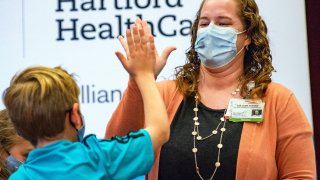
U.S. regulators on Friday authorized the first COVID-19 shots for infants and preschoolers, paving the way for vaccinations to begin next week if the Centers for Disease Control and Prevention recommends them this weekend, but when it comes to the shots themselves, there's one big difference.
The Food and Drug Administration on Friday authorized shots from both Moderna and Pfizer. That means U.S. kids under 5 — roughly 18 million youngsters — are eligible for the shots, about 1 1/2 years after the vaccines first became available in the U.S. for adults, who have been hit the hardest during the pandemic.
The vaccines are for children as young as 6 months.
The two brands use the same technology but there are differences.
Feeling out of the loop? We'll catch you up on the Chicago news you need to know. Sign up for the weekly Chicago Catch-Up newsletter here.
Pfizer's vaccine for kids younger than 5 is one-tenth of the adult dose. Three shots are needed: the first two given three weeks apart and the last at least two months later.
Moderna's is two shots, each a quarter of its adult dose, given about four weeks apart for kids under 6.
In a study of kids ages 6 months through 5 years, two Moderna shots — each a quarter of the regular dose — triggered high levels of virus-fighting antibodies, the same amount proven to protect young adults, the company said. There were no serious side effects, and the shots triggered fewer fevers than other routine vaccinations.
But the vaccine proved between about 40% and 50% effective at preventing symptomatic COVID-19 during the trial. The company blamed the omicron variant's ability to partially evade vaccine immunity, noting that unboosted adults showed similarly less effectiveness against milder omicron infections. While no children became severely ill during the study, Moderna noted high antibody levels are a proxy for protection against more serious illness — and the company will test a child booster dose.
Federal health officials said Sunday that kid-sized doses of Pfizer’s COVID-19 vaccines appear to be safe and effective for kids under 5. Late last week the FDA posted a similar analysis of Moderna’s shots for children under 6.
The FDA said children who received Pfizer’s shots during testing developed high levels of virus-fighting antibodies expected to protect them against coronavirus. That’s the basic threshold needed to win FDA authorization. But additional testing turned up key differences, with stronger results for Pfizer.
There's still one step left before the shots can begin though.
The Centers for Disease Control and Prevention recommends how to use vaccines and its vaccine advisers are set to discuss the shots for the youngest kids Friday and vote on Saturday. A final signoff would come from CDC Director Dr. Rochelle Walensky.
At a Senate hearing Thursday, Walensky said her staff was working over the Juneteenth federal holiday weekend “because we understand the urgency of this for American parents.”
For weeks, the Biden administration has been preparing to roll out the vaccines. States, tribes, community health centers and pharmacies preordered millions of doses. FDA's emergency use authorization allows manufacturers to begin shipping vaccine across the country. Vaccinations could begin as early as Monday or Tuesday.
The FDA also authorized Moderna's vaccine for school-aged children and teens. Pfizer's shots had previously been the only ones available for those ages.
Moderna next plans to study its shots for babies as young as 3-months-old. Pfizer has not finalized plans for shots in younger infants. A dozen countries, including China, already vaccinate kids under 5.
While young children generally don’t get as sick from COVID-19 as older kids and adults, their hospitalizations surged during the omicron wave and FDA’s advisers determined that benefits from vaccination outweighed the minimal risks.
Walensky said pediatric deaths from COVID-19 have been higher than what is generally seen from the flu each year.
“So I actually think we need to protect young children, as well as protect everyone with the vaccine and especially protect elders,” she said.

